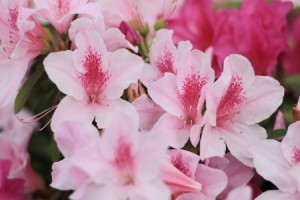YORK SCIENTIST URGES US TO ‘EMBRACE NEW INVADERS’
YORK SCIENTIST URGES US TO ‘EMBRACE NEW INVADERS’
A University of York scientist claims that invasive species such as Himalayan balsam and rhododendron should be welcomed to Britain rather than reviled. At least, they should not be hated simply because they are alien, he says.
Chris Thomas, Professor of Conservation Biology at York, says that non-native species usually add to biodiversity and that the response of people who find themselves ‘invaded’ by these ‘displaced’ species is often irrational.
“It is true that some invasive species damage ecosystems and can eradicate resident species, particularly when they arrive on remote oceanic islands. We should eradicate pestilential rats and goats from these islands if we can. But the same process can also increase ecological diversity. On average, less than one native species dies out for each introduced species that arrives. Britain, for instance, has gained 1,875 established non-native species without yet losing any native species to the invaders,” he says.

In our human-dominated environment – the Anthropocene – animals and plants are changing where they live in the world because of climate change, because humans move them, and are changing the world’s habitats.
Professor Thomas contends: “It is a mistake to misdirect valuable and increasingly scarce conservation funds into unwinnable wars, especially when the enemy is not especially damaging. Trying to control Himalayan balsam throughout England, just because it is alien, is a waste of effort.
“Evolutionary origination is also accelerating. Populations and species have begun to evolve, diverge, and hybridize in new man-made surroundings. Evolutionary divergence will eventually generate large numbers of sister species on the continents and islands to which single species have been introduced.”
He says that 88 hybrids between native and introduced plant species are sufficiently widespread to be mapped in the British Isles flora.
The current rate of creation of new hybridized species would be sufficient to increase the number of plant species by 20 per cent within 15,000 years. Some like the entirely new hybrid species, Senecio eboracensis, became extinct soon after it arose in York, arousing little concern. In practice, it seems that new Anthropocene species are regarded as far less valuable than those that went before.
Professor Thomas says: “We need more concerted scientific investigation of the rates at which different processes generate diversity. Together, they could plausibly result in a net increase in the number of species on Earth during the Anthropocene (say, over a million years), despite the fact that we are, unfortunately, losing irreplaceable species that currently exist.”
Professor Chris Thomas’s World View article ‘The Anthropocene could raise biological diversity’ was published in Nature.
